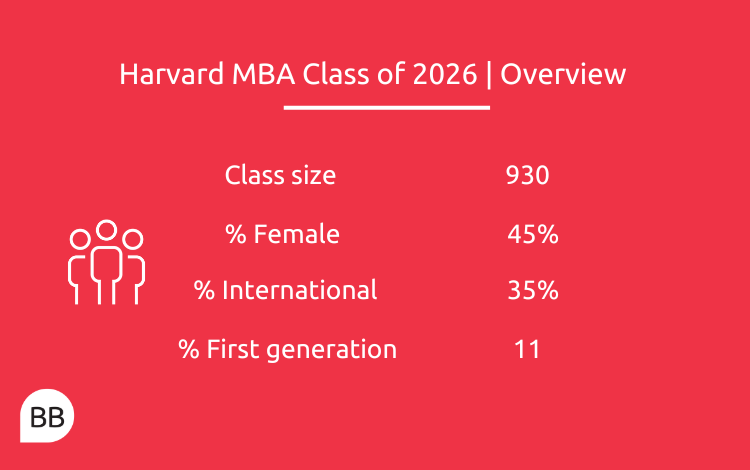Harvard Business School (HBS) is famous for churning out greedy Wall Street types who’ll make millions and donate some back to the school, perpetuating the cycle of inequality and unfairness that has led to our current culture wars in the first place… Right?
No! At least, not in my experience. When I first got to Harvard, I was amazed at how seriously each of the professors, administrators, and admissions staff took the school’s mission: to educate leaders who make a difference in the world.
While our first-year curriculum had two required finance classes, they felt like a baseline of business education rather than a push toward Wall Street. Our entire second-year curriculum was elective, with plenty of classes focused on social impact to choose from, and our first-year leadership class focused not just on leadership style, but on integrity, and asked us each to envision the difference we wanted to make in the world.
With all that said, what is Harvard Business School really looking for when they evaluate potential candidates for admission? Here’s my perspective—but bear in mind, this is my opinion as a graduate, not as a member of admissions staff!
1. Clear the bar
It’s absolutely true that there’s a certain bar of standards that if you don’t clear, it will be difficult to gain admission.
Firstly, the GMAT: Harvard’s median GMAT is one of the highest in the world, typically in the 96th percentile. Even with a score in this range, that’s no guarantee of admission—especially if your background is highly traditional, you might want to try hard to push above that. You can use similar percentile ranges for the GRE.
Secondly, work experience: what you’ve done matters.
The average incoming student at Harvard Business School has five years of post-college work experience. While you don’t need to have big names on your resume, those can help you because they represent a filter—a bar you’ve already cleared.
If you don’t have those big-name employers, that’s ok, but you’ll want to make sure your story is interesting and unique enough to offset that lack of a reliable indicator!
READ: What GMAT Score Do You Need For Harvard?
 ©Susan Young for Harvard Business School
©Susan Young for Harvard Business School
Next, grades: you don’t need to have had a college 4.0 to get into Harvard. The admissions team will take into account the difficulty of your school and major; the average is 3.69. If you’re far below that, it can be a red flag—possibly indicating a lack of effort more than a lack of intellect.
Then, there’s leadership experience. This can come from anywhere, but it’s absolutely something admissions will be looking for. How can you show that you can make a difference in whatever situation you find yourself in?
HBS’s definition of leadership is broad, but it always includes making some sort of meaningful difference in the world around you. If your experience is solely focused on improving your own position, that will be tough for admissions to get over.
Finally, let’s talk about recommendations. You’ll need extremely strong recommendations, period.
Each evaluator will be asked to rank you on several aspects of your work and character. Not rate—rank. Meaning, they’ll have to say if you’re the best they’ve ever seen, the top 5%, the top 10%, and so on. That question forces some honesty.
Obviously, this means you need to be thoughtful in choosing who recommends you, but if you’re a few years away from applying, it simply means that you should put in your absolute best, every day, in all aspects of your life. Referees who’d love to vouch for you will come naturally if you’ve done that.

2. Bring a unique voice
Beyond just clearing the bar, it’s important to show you bring something unique to the HBS classroom.
HBS teaches using the case method: each student comes to class each day having read and analyzed a case, often involving a protagonist in a difficult business situation or facing a difficult choice. The students’ job is to reason and debate with each other about the case, often advocating for one action or another.
You can imagine this type of interaction wouldn’t be all that helpful if everybody came with the same perspective. That’s one of the reasons HBS tries to foster a class that’s as diverse as possible: in terms of race, gender, sexuality, nationality, background, experience, and so on.
In your application, I’d be sure to highlight how your voice is unique and will add a valuable perspective that might not otherwise be represented in the classroom.
3. Further the mission
As I mentioned above, my experience is that people at HBS truly do believe in their mission.
They want leaders who will make a difference, and again, that is open to broad interpretation. While it implies impact beyond just making money, it also leaves a lot of room for your own implementation of it.
When you’re writing essays, doing an interview, or in any other pre-acceptance interaction, make sure that you’re clear about how you can help further the HBS mission. Be thoughtful and sincere about how you’ll make that difference, even if you don’t have the exact details nailed down.
My essays absolutely spoke to the fact that I wanted to employ people and create positive work environments through entrepreneurship; I didn’t know that would take the form of ZipBooks, my accounting software startup, or Jump, my AI solutions startup for financial advisors, but that was ok!
They’re looking for the attributes of leadership and general directionality, but they don’t need to see rigid plans in order to see a leader.
READ: Harvard MBA Class Profile | Breakdown
©Tara Sanon for Harvard Business School
4. Get a little bit lucky
Lastly, be aware that even with a perfect application, there’s an element of luck involved. And it’s not just HBS—at any competitive business school, this comes into play. If you don’t get an interview, or you do and you don’t get in, be aware that it’s not necessarily a reflection on you.
First of all, as much as they’d like to judge you directly, the admissions team is really judging an imperfect proxy (your application). And secondly, there are additional requirements they’re trying to meet in terms of geography, background, and other diversity factors you have no control over.
I was lucky enough (and I mean that term literally) to get in, but I would have been the same person if I hadn’t. Clear the bar, focus on what makes you unique, sincerely explain how you’ll become a leader who makes a difference, and then let the chips fall where they may.
If you do that, you’ll be on a good path—no matter what happens with your application!
This article was first published in June 2018 and updated with the latest figures in October 2024.



